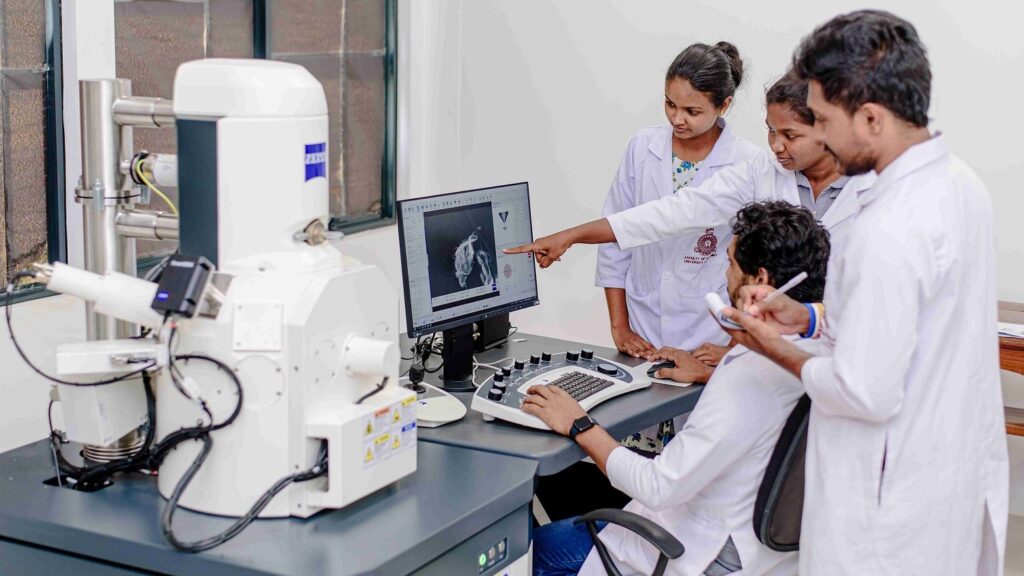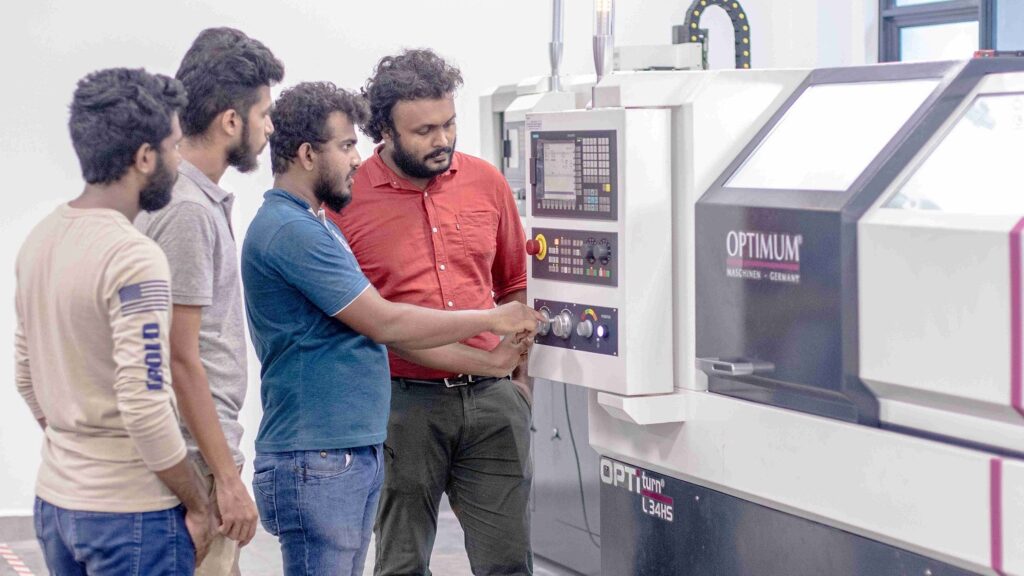Scanning Electron Microscope

A scanning electron microscope (SEM), a type of microscope, is designed for directly studying the surfaces of solid materials with high resolution. The SEM projects and scans a focused high-energy beam of electrons over a surface. The signals that drive from electron-sample interactions reveal information about the sample including external morphology (texture), and chemical composition of the sample. The Faculty of Technology, University of Colombo possesses a ZEISS EVO 18 analytical SEM facility at the Faculty premises. It provides excellent quality imaging results with a resolution of up to 2 nm with the capability to handle a variety of materials. The SEM is also capable of performing an analysis of the chemical composition of selected point locations of the sample using Energy Dispersive Spectroscopy (EDS). This instrument is perfectly suited to a variety of research applications such as material characterization in areas of Electronics, Semi conductors, Geo science, Bioscience, etc. The SEM can also be utilized in services apart from academic and research activities.
Mechanical Workshop

A well-equipped mechanical workshop is currently being established at the Faculty of Technology. The mechanical workshop is equipped with a variety of machines namely lathe machines, milling machines, different types of computer numerical controlled (CNC) machines, woodworking machines, welding machines, hydraulic presses, laser cutters with metal cutting, surface grinders, shearing machines, rolling machines, band saws, tool grinders and pedestal drills, etc. These tools and machinery are extensively utilized for teaching and research & development. In addition, these tools and machinery are utilized for training programs, workshops, seminars and etc. Students have the advantage of obtaining hands-on experience by handling these industrial tools and equipment leading to the development of technical capabilities which enable them to become technology professionals.
Department of Agricultural Technology
State-of-the-art Infrastructure Facilities
Department of Agricultural Technology has purchased plant growth chambers and range of other equipment necessary for conducting plant tissue culture. Further, Department is equipped with the state-of-the-art infrastructure facilities namely a plant house and a greenhouse. Curriculum of the Bachelor of Biosystems Technology in Agriculture, the degree programme offered by the Department of Agricultural Technology consists of a range of courses related to crop technology where these facilities can be effectively utilized. Thus, students can design, and conduct experiments related to plant breeding, varietal improvement, planting material acclimatization, optimizing crop growth conditions, studying precision irrigation systems, growing of off-season crops and etc. Further, this facility can be extensively used in research & development activities of the higher degree programmes offered by the Department. Moreover, this will be a modern facility available in a state university in Sri Lanka.
High Throughput Screening / Bioactivity Testing Facility
High Throughput Screening (HTS) is a modern analytical technique widely used in detecting and quantifying biological, chemical and physical parameters of samples in micro titer (micro well) plates. This technique is extensively used in Research & Development especially in the fields of Bioassay Validation, Drug Discovery, Food Technology, Biotechnology, Cell Biology, Microbiology, Biochemistry, Quality Control and etc. The Faculty of Technology, University of Colombo has well established HTS or Bioactivity Testing Facility at the Department of Agricultural Technology. The Department has acquired all high-tech equipment relating to bioactivity testing namely multimode micro plate reader, high speed centrifuge, micro plate centrifuge, -80°C freezer, freeze dryer, shaking water baths, incubators, and full range of molecular biology equipment. Further, establishment of a fully furnished animal cell culture laboratory is also in progress which enables extending the research activities up to signal transduction pathways. Currently this facility is being used in the Department for both academic and research activities and will be used extensively for higher degree programmes offered by the Department in near future. This facility can also be utilized in services apart from the academic and research activities and therefore has a high commercial value. Most importantly, this is a modern facility established in a State University in Sri Lanka.